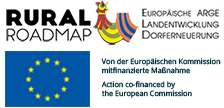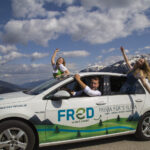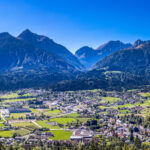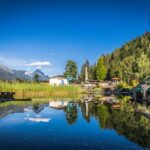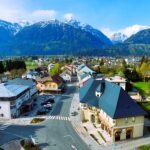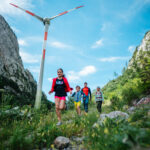Kötschach-Mauthen, Carinthia, Austria
The rural community of Kötschach-Mauthen is located in the Gail Valley in south-west Carinthia and comprises 31 villages with 3,310 inhabitants. Around 2,200 of them live in the twin villages of Kötschach and Mauthen. The community is geared towards the Alps-Adriatic region and sees itself as a border community that deliberately crosses (old) borders repeatedly. Since 2009, a development process has been happening in the community. A number of strong and sustainable projects were implemented, which are significantly supported by several entrepreneurs.
For example, the Kolbitsch family has been a pioneer in sustainable, ecological camping since 1995. The company has drawn up a mission statement according to which it strives to use natural resources sparingly and offers camping, glamping and wellness. The company has an extremely low ecological footprint per overnight stay compared to European standards, subsequently being awarded with the EU-Eco-Label.
The entrepreneurial Klauss family, in turn, built a hydroelectric power plant in 1886 and an electrical power grid in 1899. Later, they continuously expanded operations in the valley and in the neighboring regions. It still operates part of the power grid in the community today. The company proved to be a natural power pioneer in many areas: For example, it built and operates the first high mountain wind turbine in Europe, the only two wind turbines in Carinthia, the first wind power plant in Slovenia, underground power plants and the only private storage power plant in the region. It is involved in numerous innovative projects to promote the energy transition, operates fast charging stations for electromobility and much more.
In addition to this major player, other actors are also active in the production of green electricity. In the entire municipality of Kötschach-Mauthen there are now 21 small hydroelectric power plants, three ecological mountain reservoirs, two wind turbines, several solar and photovoltaic systems as well as three district heating networks and two micro-heating networks in which renewable raw materials are used. Thanks to this infrastructure, the community is self-sufficient in energy and is considered a model community in the field of alternative energies far beyond national borders. It is officially recognized as a climate-energy model region. These projects are flanked by the “energie:autark Kötschach-Mauthen” association, which has been operating an e-car sharing model since 2017. It is available across the greater region and is supported by the municipality and local businesses as they provide parking lots and charging stations and also commit to a minimum usage. Several local entrepreneurs took over a derelict industrial hall with an operating license and installed a photovoltaic system on the roof. The large industrial hall is being repurposed, being partly rented out and partly used for industrial production, meaning that some of the jobs could be retained and industrial production will remain possible in the valley in the future.
The joint takeover of a vacant hotel is also intended to revive an existing building through a new use: part has already been converted into a hotel purely for overnight stays, and co-working spaces will be gradually created in other rooms, which will offer new opportunities, especially for young service providers. These examples highlight that the municipality has a great entrepreneurial spirit driving its sustainable and future-oriented development. The municipal policy strategy is to bring together stakeholders from different areas in order to strengthen the region through joint projects. The two villages now boast initiatives in virtually all areas.
In tourism, sustainability is sought through various initiatives: Since 2011, the community has the label of “Mountaineering Village”, which is based on the guidelines of the Alpine Convention and, thanks to hard criteria, promotes sustainable mountain tourism. Since 2015, the municipality has been conducting active location marketing. Regional producers are supported via the “Feinspitzweg” and the “Bio – Bin in Ordnung” project provides producers with opportunities for direct marketing and awareness-raising among consumers. The region also benefits from personalities such as the “Edelgreissler” Herwig Ertl, who – as a strong driving force and “ambassador of enjoyment” – continues to develop the place sustainably. Unsurprisingly, the community has also been a “Slow Food Travel Region” since 2015. In addition, in 2022 the “KlimaEnergieModellregion” (climate-energy model region) was launched, a project with high funding that is intended to provide further impetus in the field of tourism.
Social interaction is characterized by numerous active clubs – the local group of the Austrian Alpine Club with over 4,500 members provides special impetus for youth development. A remarkable project are the display boards for the individual house histories in Mauthen, which are presented in an exciting and graphically attractive way. The municipality is also well positioned in the area of modern communication. In 2022, 65 percent of it will be equipped with broadband internet. The laying of fiber optics in full expansion will be completed in 2024.
The strong entrepreneurial work was reinforced by the trade association and the cheese association, which organized public events until 2009. However, both associations have dissolved due to work overload for key figures. Subsequently, the municipality itself has gradually taken over some of their tasks. It moderates entrepreneurial activities through new structures, whereby a process of professionalization was implemented by hiring employees who noticeably relieve the new associations in their efforts.
Kötschach-Mauthen is a municipality with high entrepreneurial potential and political leaders who are aware of the challenges of the future and try to moderate the sustainable projects and processes. The extraordinarily high level of alternative energy production is outstanding. Strong signals are also being sent in direct marketing, the conversion of empty buildings and sustainable tourism.
Evaluated: 2022
